- Home
- Bruce Sterling
Islands in the Net Page 3
Islands in the Net Read online
Page 3
“I’ve got the Report’s rough draft,” Emily announced. “It’s pretty much what we expected.”
Emily pulled her copy of the Quarterly Report from a drawer.
She flipped pages. “Let’s get to the major stuff. The Committee election. We’ve got twelve candidates, which is a joke, but three front-runners. Pereira’s an honest guy, you could play poker with him by telex, but he can’t live down that Brasilia debacle. Tanaka pulled a real coup with that Osaka lumber deal. He’s pretty flexible for an old-line salary man, but I met him in Osaka last year. He drank a lot and wanted to pinch me. Besides, he’s into countertrade, and that’s my turf.
“So we’ll have to back Suvendra. She came up through the Djakarta office, so the East Asian contingent’s behind her. She’s old, though.” Emily frowned. “And she smokes. An ugly habit and it tends to rub people the wrong way. Those clove-scented Indonesian cancer sticks—one whiff and you’re ready for a biopsy.” She shuddered.
“Still, Suvendra’s our best bet. At least, she’ll appreciate our support. Unfortunately that moron Jensen is running again on a youth platform, and that’ll cut into the votes we can swing. But to hell with it.” She pulled at a coil of hair. “I’m tired of playing the young ingenue anyway. When I run again in ’25 I think we should aim for the Anglo and feminist vote.”
She flipped pages, frowning. “Okay, a quick review of the party line. Let me know if you need more data on the arguments. Philippines farm project: no way. Farming’s a black hole and Manila’s price supports are bound to collapse. Kymera joint project: yes. Russian software deal: yes. The Sovs still have hard-currency problems, but we can cut a good countertrade in natural gas. Kuwaiti housing project: no. Islamic Republic: the terms are good but it stinks politically. No.”
She paused. “Now here’s one you didn’t know about. Grenada United Bank. The Committee’s slipping this one in.” For the first time, Emily looked uneasy. “They’re an offshore bank. Not too savory. But the Committee figures it’s time for a gesture of friendship. It won’t do our reputation much good if the whole thing is hashed out in public. But it’s harmless enough—we can let it go.”
Emily yanked open a wooden drawer with a squeak and put the Report away. “So much for this quarter. Things look good, generally.” She smiled. “Hello, David, if you’re watching. If you don’t mind, I’d like a private word with Laura now.”
The screen went blank for a long moment. But the time elapsing didn’t cost much. Prerecorded one-way calls were cheap. Emily’s call had been compressed into a high-speed burst and sent from machine to machine overnight, at midnight rates.
Emily reappeared on the screen, this time in her bedroom. She now wore a pink-and-white satin night-robe and her hair had been brushed out. She sat cross-legged in her wooden four-poster bed, a Victorian antique. Emily had refinished her ancient, creaking bed with modern hard-setting shellac. This transparent film was so mercilessly tough and rigid that it clamped the whole structure together like cast iron.
She had attached the phone camera to one of the bedposts. Business was over now. This was personal. The video etiquette had changed along with Emily’s expression. She had a hangdog look. A new camera angle, looking down into the bed from a somewhat superior angle, helped convey the mood. She looked pitiful.
Laura sighed, pausing the playback. She shifted Loretta in her lap and nuzzled her absently. She was used to hearing Emily’s problems, but it was hard to take before lunch. Especially today. Weirdness beginning to mount. She lifted her finger again.
“Well, I’m back,” Emily intoned. “I suppose you can guess what it is. It’s Arthur again. We had another fight. A brutal one. It started as one of those trivial things, about nothing really. Oh, about sex I guess, or at least that’s what he said, but it came out of the blue for me. I thought he was being a bastard for no reason. He started sniping at me, using That Tone of Voice, you know. And once he gets that way he’s impossible.
“He started shouting, I started yelling, and things just went straight to hell. He almost hit me. He clenched his fist and everything.” Emily paused dramatically. “I ran back in here and locked the door in his face. And he didn’t say a damned thing. He just left me in here. When I came out he was gone. And he took …” Her voice shook for a moment and she waited it out, pulling at a long strand of hair. “He took that photo he made of me, the black-and-white one in period dress, that I really liked. And that was two days ago and he doesn’t answer his goddamn phone.”
She looked close to tears. “I don’t know, Laura. I’ve tried everything. I’ve tried men in the company, men outside, and it’s just no luck at all. I mean, either they want to own you and be the center of the universe, or they want to treat you like some bed-and-breakfast service and expose you to Christ knows what kind of disease. And it’s been worse since I’ve been on the Committee. Rizome men are a lost cause now. They tiptoe around me like I was a goddamn land mine.”
She looked off-camera. “C’mon, kitty.” A Persian cat jumped onto the bed. “Maybe it’s me, Laura. Other women come to decent terms with men. You certainly did. Maybe I need outside help.” She hesitated. “Someone put an anonymous post on the trade division board. About a psychiatric drug. Marriage counselors are using it. Romance, they call it. You ever hear of it? I think it’s illegal or something.” She stroked her cat absently.
She sighed. “Well, this is nothing new. Emily’s sob story, year thirty-two. I think it’s through between me and Arthur now. He’s an artistic type. A photographer. Not in business at all. I thought it might work out. But I was wrong as usual.” She shrugged. “I should look at the bright side, right? He didn’t ask me for money and he didn’t give me a retrovirus. And he wasn’t married. A real prince.”
She leaned back against the mahogany headboard, looking tired and defenseless. “I shouldn’t tell you this, Laura, so be sure to erase it first thing. This Grenada Bank deal—that meeting you’re about to hold is part of it. Rizome’s sponsoring a meeting on data banking and data piracy. That doesn’t sound like anything new, but listen: it’s with actual live pirates. Sleazy offshore types from the data havens. Remember the fight we put through to get your Lodge equipped for major meetings?”
Emily grimaced and spread her hands. “Well, the Europeans should be there already. They’re the tamest of the bunch—the closest to legit. But you can expect some Grenadians in tomorrow, with one of our security people. The Committee’s sent you the schedule already, but not the full details. As far as you know, they’re all legitimate bankers. Be nice to them, all right? They may be crooks to us, but what they do is completely legal in their little enclaves.”
She frowned. The cat dropped to the floor with a thump off-camera. “They’ve been taking bites out of us for years, and we’ve got to talk some sense into them. It looks bad for Rizome to cozy up to pirates, so keep it quiet, all right? I’m being stupid here, because I wanted to give you a break. If it comes out that I leaked this, the Committee will slap me down hard. So you’d better be a lot more discreet than I am. Okay, end of message. Send me a tape of the baby, all right? Say hi to David.” The screen went blank.
Well, now she had it all. She erased the tape. Thanks, Em. Pirate data bankers, no less. Creepy little hustlers from some offshore data haven—the kind of guys who chewed matchsticks and wore sharkskin suits. That explained the Europeans. Bankers my eye. They were all rip-off artists. Crooks.
They were nervous, that was it. Jumpy. And no wonder. The general potential for embarrassment in this situation was vast. One phone call to the Galveston police and they could all be in muchissimo hot water.
She was a little mad at the Committee for being cagy about it. But she could see their reasons. And the more she thought about it, the more she recognized it as a gesture of trust. Her Lodge was going to be right in the middle of some very delicate action. They could easily have taken it to another Lodge—like the Warburtons in the Ozarks. This way they were going to have to lev
el with her. And she was going to see it all.
After a late lunch, she took the Canadians into the conference room in the tower. They logged in to Atlanta and picked up their last messages. They killed a couple of hours before departure, grinning into videophones and gossiping. One of the women had run out of video rouge and had to borrow Laura’s.
At four, the fall Quarterly Report came on line, a little early. The printers chattered hard copy. The Kurosawas picked up their Portuguese translation and left.
David showed up at five o’clock, and he’d brought his wrecking crew. They stomped into the bar, raided the beer, and rushed upstairs to see the baby. Laura’s mother arrived, sunburned from her boat trip to the OTEC. Galveston’s Ocean Thermal Energy Converter was a civic pride and joy, and one of David’s crew had been on the project. Everyone seemed delighted to trade notes.
David was peppered head to foot with grime and sawdust. So were his four wrecking buddies. In their work shirts, denim overalls, and heavy boots, they looked like Depression hoboes. Actually David’s friends were a dentist, two marine engineers, and a biology professor, but appearances counted. She tugged his shoulder strap. “Did the European bankers see you, coming in?”
David beamed paternally as his friends admired Loretta’s amazing new skill at clenching her sweaty little fists. “Yeah, so?”
“David, you reek.”
“A little honest sweat!” David said. “What are we, Marxists? Hell, they envy us! Those Luxembourg paper shufflers are dying for a day’s honest work.”
Supper with David’s friends was a great success. David broke his principles and ate the shrimp, but refused to touch the vegetables. “Vegetables are full of poisons!” he insisted loudly. “They’re crammed with natural insecticides! Plants use chemical warfare. Ask any botanist!”
Luckily no one pursued the subject. The wrecking crew called vans and left for home. Laura locked up for the night while the staff loaded the dishes. David took a shower.
Laura limped up to the top floor to join him. It was sunset. Mr. Rodriguez lowered the flags on the roof and tottered back down three flights of stairs to staff quarters. He was a stoic old man, but Laura thought he looked tired. He’d had lifeguard duty. The Canadians’ manic brood had run him ragged.
Laura kicked off her sandals and hung her vest and skirt in the bedroom closet. She shrugged out of her blouse, then sat on the bed and peeled off her hose. Her injured ankle had swollen and was now an impressive blue. She kicked her legs out straight and leaned back against the headboard. A ceiling vent came on and cool air poured over the bed. Laura sat in her underwear, feeling tired and vaguely squalid.
David stalked naked out of the bathroom and disappeared into the baby’s room. She heard him making soothing goo-goo noises. Laura checked tomorrow’s schedule on her watchphone. Her mother was leaving tomorrow. Her departure flight to Dallas was scheduled just before the Grenadians arrived. Laura grimaced. Always more trouble.
David emerged from the baby’s room. His long hair was parted in the middle and wet-combed down, flatly, over his ears and neck. He looked like a demented Russian priest.
He flopped down onto the bed and gave her a big, knowing grin. Make that a demented Russian priest with a yen for women, Laura thought with a sinking feeling.
“Great day, huh?” He stretched. “Man, I worked my ass off. I’ll be sore tomorrow. Feel great now, though. Lively.” He watched her with narrowed eyes.
Laura was not in the mood. A sense of ritual settled over both of them, a kind of unspoken bargaining. The object was to make your mood set the tone of the evening. Souring it was a foul.
There were multiple levels of play. Both sides won big if you both reached the same mood quickly, through sheer infectious charisma. You won second-class if you got your own way without feeling guilty about it. Pyrrhic victory was when you got your own way but felt rotten. Then there were the various levels of giving in: Gracious, Resigned, and Martyr to the Cause.
Fouls were easiest, and then you both lost. The longer the ritual lasted, the more chances there were to screw up. It was a hard game to play, even with eight years’ practice.
Laura wondered if she should tell him about the Church of Ishtar. Thinking about the interview revived her sense of sexual repulsion, like the soiled feeling she got from seeing pornography. She decided not to mention it tonight. He was sure to take it all wrong if he thought his overtures made her feel like a hooker.
She buried the idea and cast about for another one. The first twinge of guilt nibbled her resolve. Maybe she should give in. She looked down at her feet. “My leg hurts,” she said.
“Poor babe.” He leaned over and had a closer look. His eyes widened. “Jesus.” Suddenly she had become an invalid. The mood shifted all at once, and the game was over. He kissed his fingertip and tapped it lightly on the bruise.
“Feels better,” she said, smiling. He leaned back in bed and got under the sheet, looking resigned and peaceable. That was easy. Victory class one for the Poor Little Lame Girl.
Now it was overkill, but she decided to mention her mother anyway. “I’ll be fine when things get back to normal. Mother leaves tomorrow.”
“Back to Dallas, huh? Too bad, I was just getting used to the old gal.”
Laura kicked her way under the sheet. “Well, at least she didn’t bring some obnoxious boyfriend.”
David sighed. “You’re so hard on her, Laura. She’s a career woman of the old school, that’s all. There were millions like her—men, too. Her generation likes to get around. They live alone, they cut their ties, they stay fast and loose. Wherever they walk families crumble.” He shrugged. “So she had three husbands. With her looks she could have had twenty.”
“You always take her side. Just because she likes you.” Because you’re like Dad, she thought, and blocked the thought away.
“Because she has your eyes,” he said, and gave her a quick, snaky pinch.
She jumped, shocked. “You rat!”
“You big rat,” he corrected, yawning.
“Big rat,” she agreed. He’d broken her out of her mood. She felt better.
“Big rat that I can’t live without.”
“You said it,” she said.
“Turn out the light.” He turned onto his side, away from her.
She reached out to give his hair a final ruffle. She killed the lights, touching her wrist. She put her arm over his sleeping body and slid up against him in darkness. It was good.
2
After breakfast, Laura helped her mother pack. It surprised her to see the sheer bulk of bric-a-brac her mother hauled around: hat-boxes, bottles of hairspray and vitamins and contact-lens fluid, a video camera, a clothes steamer, a portable iron, hair curlers, a sleeping mask, six pairs of shoes with special wooden lasts to keep them from mashing down in her luggage. She even had a special intaglio box just for earrings.
Laura held up a red leather-bound travel diary. “Mother, why do you need this? Can’t you just call up the Net?”
“I don’t know, dear. I spend so much time on the road—it’s like home for me, all of these things.” She packed dresses with a swish of fabric. “Besides, I don’t like the Net. I never even liked cable television.” She hesitated. “Your father and I used to fight about that. He’d be a real Net-head now, if he was still alive.”
The idea sounded silly to Laura. “Oh, Mother, come on.”
“He hated clutter, your father. He didn’t care for nice things—lamps, carpets, dinner china. He was a dreamer, he liked abstractions. He called me a materialist.” She shrugged. “My generation always got bad press for that.”
Laura waved her arm about the room. “But, Mother, look at these things.”
“Laura, I like my possessions and I’ve paid for all of them. Maybe people don’t prize possessions now like we did in the premillennium. How could they? All their money goes into the Net. For games, or business, or television—things that come over the wires.” She zipped her b
ag shut. “Young people these days, maybe they don’t hanker after a Mercedes or a Jacuzzi. But they’ll brag like sixty about their data access.”
Laura felt impatient. “That’s silly, Mother. There’s nothing wrong with being proud of what you know. A Mercedes is just a machine. It doesn’t prove anything about you as a person.” Her watchphone beeped; the van had arrived downstairs.
She helped her mother take her luggage down. It took three trips. Laura knew she’d have a wait in the airport, so she took the baby along, in a canvas travel sling.
“Let me get this trip,” her mother said. She slipped her card into the van’s charge slot. The door clicked open and they loaded the bags and stepped in.
“Howdy,” the van said. “Please announce your destination clearly into the speaker. Anunce usted su destinacion claramente en el microfono por favor.”
“Airport,” Laura said, bored.
“… sss … ank you! Estimated travel time is twelve minutes. Thank you for using the Galveston Transit System. Alfred A. Magruder, Mayor.” The van accelerated sluggishly, its modest engine whining. Laura lifted her brows. The van’s spiel had been changed. “Alfred A. Magruder, Mayor?” she murmured.
“Galveston is Fun City!” the van responded. Laura and her mother traded glances. Laura shrugged.
Highway 3005 was the main artery down-the-island. The road’s glory days were long gone; it was haunted by the memories of cheap oil and private cars doing sixty miles per. Long sections of tarmac had been potholed into ruin and replaced with plastic mesh. The mesh crackled loudly beneath the tires.
On their left, to the west, bare cracked slabs of concrete fringed the road like fallen dominoes. Building foundations had no scrap value. They were always the last to go. Beach scrub flourished everywhere: salt grass, spreading mats of crisp glasswort, leathery clumps of reed. To their right, along the shore, surf washed the stilts from vanished beach homes. The stilts leaned at strange angles, like the legs of wading flamingos.

 Mirrorshades: The Cyberpunk Anthology
Mirrorshades: The Cyberpunk Anthology The Wonderful Power of Storytelling
The Wonderful Power of Storytelling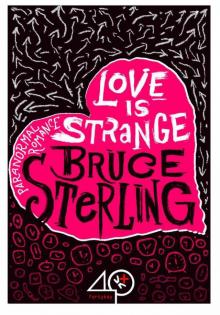 Love Is Strange (A Paranormal Romance)
Love Is Strange (A Paranormal Romance) Globalhead
Globalhead Essays. FSF Columns
Essays. FSF Columns The Hacker Crackdown
The Hacker Crackdown Bicycle Repairman
Bicycle Repairman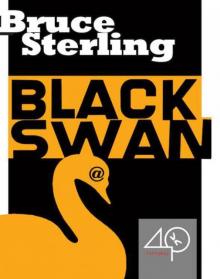 Black Swan
Black Swan Crystal Express
Crystal Express Islands in the Net
Islands in the Net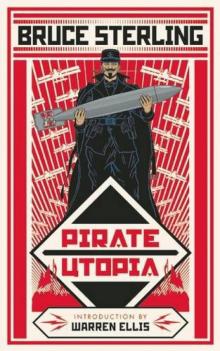 Pirate Utopia
Pirate Utopia GURPS' LABOUR LOST
GURPS' LABOUR LOST The Dead Media Notebook
The Dead Media Notebook Unstable Networks
Unstable Networks The Manifesto of January 3, 2000
The Manifesto of January 3, 2000 Heavy Weather
Heavy Weather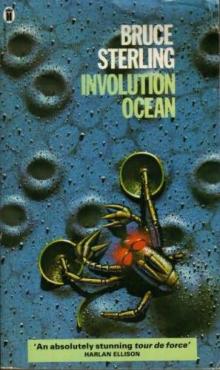 Involution Ocean
Involution Ocean The Epic Struggle of the Internet of Things
The Epic Struggle of the Internet of Things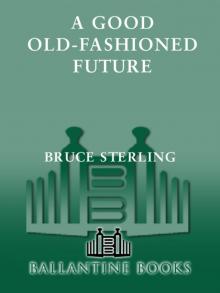 A Good Old-Fashioned Future
A Good Old-Fashioned Future The Littlest Jackal
The Littlest Jackal Zeitgeist
Zeitgeist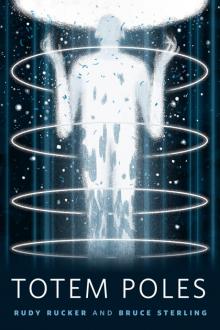 Totem Poles
Totem Poles Ascendancies
Ascendancies CyberView 1991
CyberView 1991 War Is Virtual Hell
War Is Virtual Hell Taklamakan
Taklamakan Holy Fire
Holy Fire Cyberpunk in the Nineties
Cyberpunk in the Nineties Schismatrix Plus
Schismatrix Plus The Artificial Kid
The Artificial Kid Essays. Catscan Columns
Essays. Catscan Columns Maneki Neko
Maneki Neko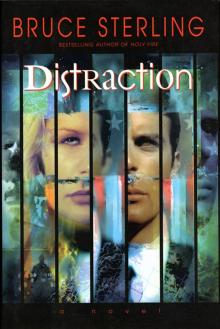 Distraction
Distraction In Paradise
In Paradise Red Star, Winter Orbit
Red Star, Winter Orbit Luciferase
Luciferase